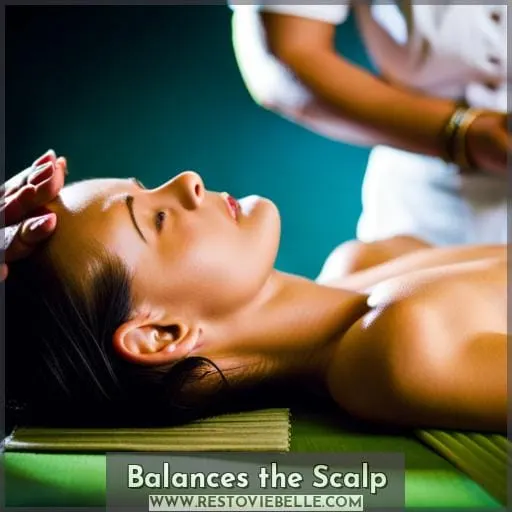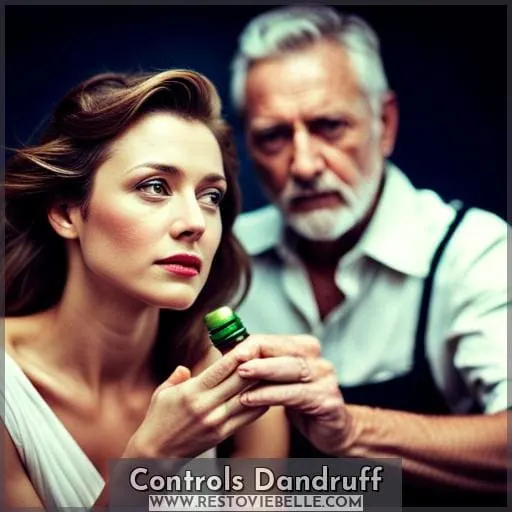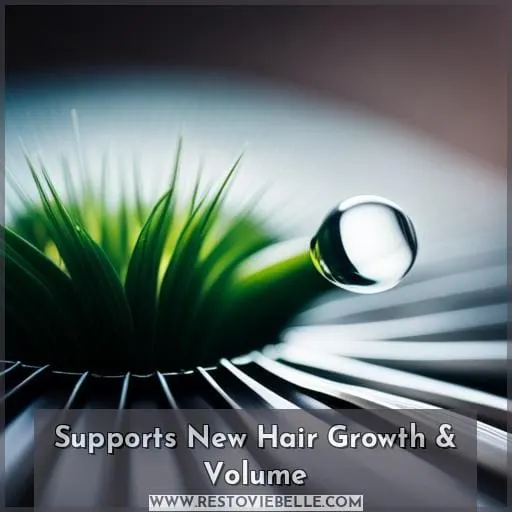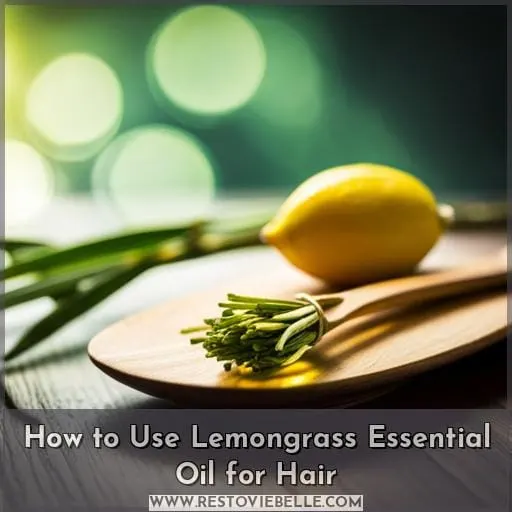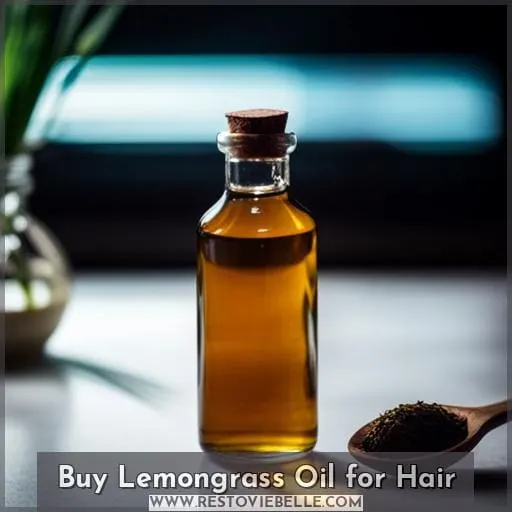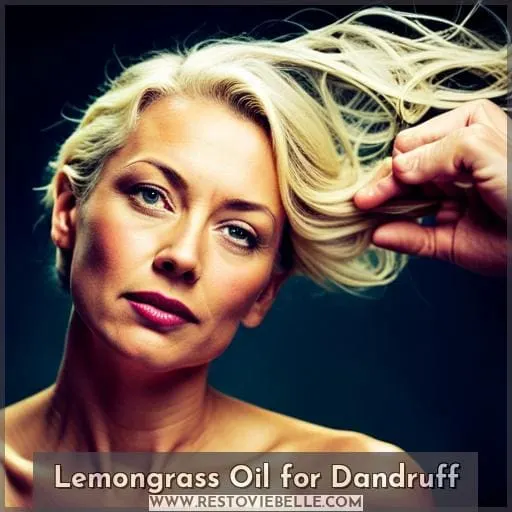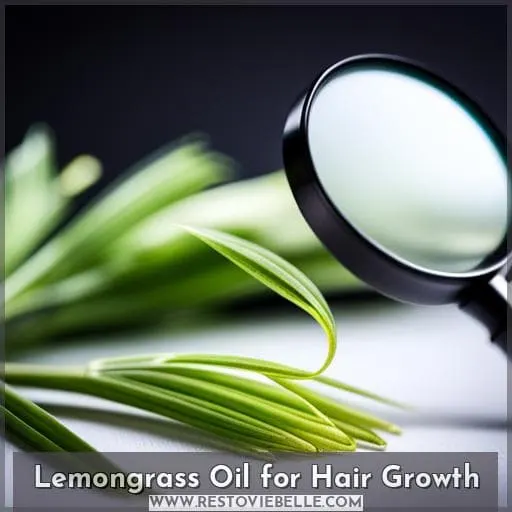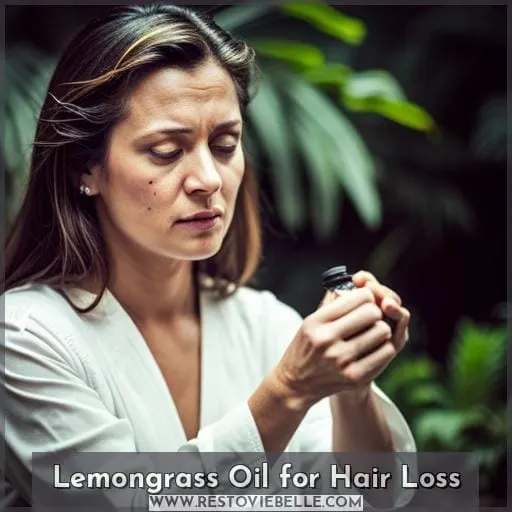This site is supported by our readers. We may earn a commission, at no cost to you, if you purchase through links.
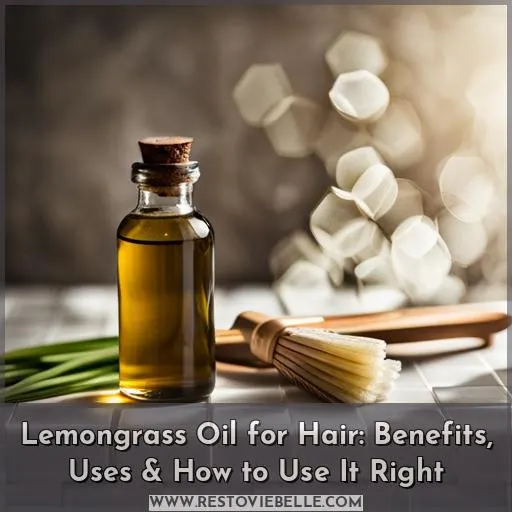
Table Of Contents
- Key Takeaways
- Balances the Scalp
- Controls Dandruff
- Freshens and Deodorizes
- Supports New Hair Growth & Volume
- Smooths Frizz, Flyaways & Split-Ends
- How to Use Lemongrass Essential Oil for Hair
- Buy Lemongrass Oil for Hair
- Lemongrass Oil for Dandruff
- Lemongrass Oil for Hair Growth
- Lemongrass Oil for Hair Loss
- Frequently Asked Questions (FAQs)
- Conclusion
Key Takeaways
- Promotes hair growth and prevents hair loss by stimulating the scalp and improving circulation
- Reduces dandruff and itchiness through anti-inflammatory properties
- Balances pH and oil production to reduce frizz
- Safe and effective when diluted properly; can be added to shampoos or applied directly
Balances the Scalp
Balancing your scalp is essential for healthy hair growth, and lemongrass oil can help.
The antibacterial and antifungal properties of lemongrass oil can help to:
- Prevent dryness
- Reduce oiliness
- Soothe irritation
- Prevent dandruff
Lemongrass oil can also promote hair growth by:
- Stimulating the scalp
- Improving circulation
Controls Dandruff
Lemongrass oil can help control dandruff by reducing inflammation and itching on the scalp.
It has antibacterial and antifungal properties that can kill the bacteria and yeast that cause dandruff.
It can also help to balance the pH of the scalp, which can help to prevent dandruff from forming.
It’s a natural astringent, which can help to tighten the pores on the scalp and reduce oil production.
It has a cooling and soothing effect on the scalp, which can help to relieve itching and inflammation.
It’s a natural deodorizer, which can help to eliminate the odor of dandruff.
Freshens and Deodorizes
Lemongrass oil can help to:
- Remove odor from your hair, making it smell fresh and clean.
- Prevent hair loss.
- Reduce dandruff.
- Promote hair growth.
The stimulating properties of lemongrass oil can help to:
- Stimulate hair follicles and promote new hair growth.
The emollient properties of lemongrass oil can help to:
- Smooth frizz, flyaways, and split ends.
Supports New Hair Growth & Volume
To promote new hair growth and increase volume, incorporate lemongrass oil into your hair care routine.
The stimulating properties of lemongrass oil can help to increase blood flow to the scalp, which can promote hair growth.
Additionally, lemongrass oil can help to reduce hair loss, increase hair thickness, prevent hair breakage, and treat ingrown hair.
When used as a hair tonic, lemongrass oil can also help to promote hair shine and reduce frizz.
Smooths Frizz, Flyaways & Split-Ends
Now that we’ve explored how lemongrass oil can support new hair growth and volume, let’s move on to another fantastic benefit: it smooths frizz, flyaways, and split-ends.
If you struggle with unruly hair that just won’t cooperate no matter what you do, incorporating lemongrass oil into your hair care routine could be a game-changer.
Lemongrass oil has emollient properties that help to prevent breakage and reduce static in the hair. It adds shine while also detangling and softening your locks. No more dealing with those pesky flyaways or dealing with the frustration of split-ends ruining your hairstyle.
In addition to taming frizz and providing a sleeker look for your strands, using lemongrass oil can also help address other common issues like headaches caused by tension or stress-related scalp conditions.
Plus, its antibacterial properties make it effective against lice infestations as well as ingrown hairs.
Say goodbye to damaged hair woes by harnessing the power of lemongrass essential oil!
How to Use Lemongrass Essential Oil for Hair
Are you wondering how to incorporate lemongrass essential oil into your hair care routine? Here are 3 simple steps:
- Dilute lemongrass oil with a carrier oil (like jojoba or coconut oil).
- Apply the mixture to your scalp and hair.
- Massage your scalp and hair for a few minutes.
Lemongrass oil is safe to use on hair, but it’s important to dilute it with a carrier oil to avoid any irritation. You can use lemongrass oil on your hair as often as you like, but it’s best to start with once or twice a week and gradually increase the frequency if needed.
Some side effects of using lemongrass oil on hair include scalp irritation, dryness, and hair loss.
Store lemongrass oil in a cool, dark place.
Buy Lemongrass Oil for Hair
When buying lemongrass oil for hair, it’s important to choose a pure, high-quality essential oil.
You can verify the quality of an essential oil by looking for a product that has been verified by an independent, third-party lab GC/MS testing.
Lemongrass Oil for Dandruff
Lemongrass oil can help to control dandruff by reducing inflammation and itching on the scalp.
To use lemongrass oil for dandruff, add a few drops to your shampoo or conditioner. You can also apply it directly to your scalp and leave it on for a few minutes before washing it out.
Lemongrass oil is generally safe to use, but it’s important to dilute it with a carrier oil before applying it to your scalp.
Lemongrass Oil for Hair Growth
Lemongrass oil can help to promote new hair growth by stimulating the scalp and improving circulation.
To use lemongrass oil for hair growth, add a few drops to your shampoo or conditioner, or massage a few drops directly into your scalp.
You can also use lemongrass oil as a carrier oil for essential oils that are known to promote hair growth, such as rosemary oil or peppermint oil.
Lemongrass Oil for Hair Loss
Lemongrass oil may help to treat non-genetic hair loss by stimulating hair growth and reducing inflammation.
Here are 4 ways to use lemongrass oil for hair loss:
- Add a few drops of lemongrass oil to your shampoo or conditioner.
- Massage a few drops of lemongrass oil into your scalp before you shampoo.
- Apply a few drops of lemongrass oil to your hair before styling.
- Take a few drops of lemongrass oil internally as a supplement.
If you’re experiencing hair loss, it’s important to see a doctor to rule out any underlying medical conditions. Lemongrass oil can be a helpful natural remedy for hair loss, but it isn’t a substitute for medical treatment.
Frequently Asked Questions (FAQs)
How long does it take for lemongrass oil to work for hair growth?
It can take 2-3 months for lemongrass oil to show results for hair growth. Be patient and consistent with your use, and you should see a difference in the thickness and fullness of your hair.
Is lemongrass oil safe for pregnant women?
Unfortunately, I don’t have enough information or expertise to definitively state whether lemongrass oil is always safe for pregnant women.
Can lemongrass oil be used on children?
Yes, lemongrass oil can be gently massaged into children’s scalps and hair when appropriately diluted. However, first discuss use and dilution with your pediatrician, especially for infants.
What are the side effects of lemongrass oil for hair?
When using lemongrass oil on hair, some possible side effects to watch for include:
- Skin irritation
- Allergic reaction
Do a patch test before widespread use.
Is lemongrass oil better than other essential oils for hair?
Yes, lemongrass oil is highly effective for hair health compared to other oils.
Its antimicrobial properties thoroughly cleanse follicles and scalp without drying.
Blending lemongrass with carrier oils boosts thickness and shine while preventing split ends.
For optimal nourishment, incorporate into your regimen.
Conclusion
If you’re looking for a natural way to improve the health and appearance of your hair, lemongrass oil is a worthy option.
- Balance the scalp
- Control dandruff
- Freshen and deodorize
- Support new hair growth and volume
- Smooth frizz, flyaways, and split ends

